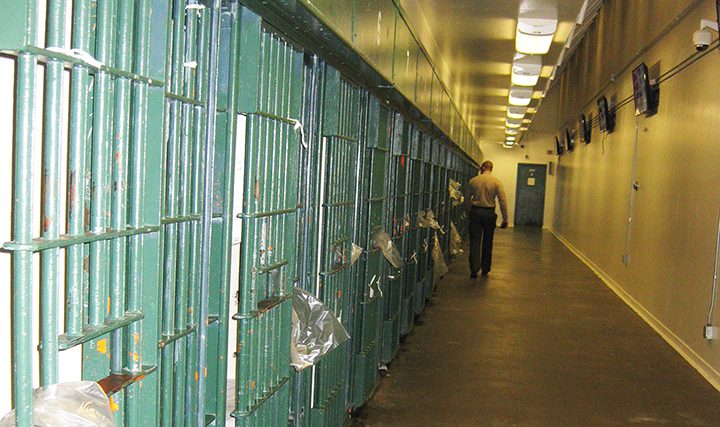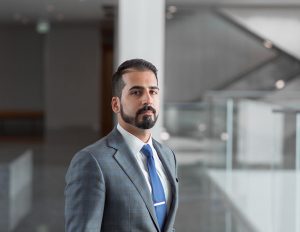Jackie Lacey’s talk about treatment not cells for the mentally ill is meaningless until she and her prosecutors implement real change in LA’s courtrooms.
by Nikhil Ramnaney
Last month, Los Angeles County District Attorney Jackie Lacey suffered a serious setback in her bid for a third term as LA’s chief prosecutor when the LA County Democrats endorsed former San Francisco District Attorney George Gascón by a large margin.
In a statement following this startling rebuke, Lacey again touted her progressive accomplishments and claimed that she had steered her office “toward a greater focus on getting treatment for those who suffer from mental illness, rather than incarceration.” Her public claims sound like good steps: using diversion to route people toward treatment instead of jail, retraining first responders, and focusing on reentry resources. But what we’re seeing on the ground doesn’t match the rhetoric that Lacey is now trying to make a focal point of her reelection campaign.
My position as a public defender in Los Angeles County has opened my eyes to the painful ways in which solvable-yet-unsolved failures of the system affect vulnerable people. Every day I encounter people suffering from mental illness, whose situations are exacerbated by the severe consequences of criminal prosecution. I visit my clients in LA County jails and witness their deplorable living conditions. My team and I investigate my clients’ backgrounds, procuring medical records and collaborating with psychological experts to identify issues and recommend appropriate community-based treatment options that have statistically better outcomes than lock-ups. I often counsel family members on how to cope as they struggle to support a loved one with mental illness. I have spent my entire legal career persuading courts and prosecutors to treat the mentally ill as people with illnesses, instead of caging and punishing them for their disease or the circumstances that arise from it. Despite her claims, in practice, Jackie Lacey has rejected this view, which has led to her office’s failure to meaningfully divert the mentally ill from the criminal system.
Her position on diversion courts, which Lacey repeatedly highlights as an important tool for routing people with mental illness into alternatives to incarceration, is an instructive case in point. In her public statements and published criteria: she is only open to diversion for non-violent offenders, which excludes a large population of people whose criminal charges stem from their psychiatric symptoms. Heaping additional punishment on a psychiatric patient who struggles with an orderly, for example, or a person who lashes out while hallucinating, is self-defeating. They, like any person with mental illness, can’t get well in a cell. So why restrict the very courts and programs that are designed to help?
Offering diversion also becomes little more than a campaign ad slogan if the deputy district attorneys who staff the courts aren’t aligned with this mission.
Recently, a young woman with bipolar disorder suffered an angry and violent outburst at home. The police were called and she was charged with assaulting and threatening her mother and sister. The case was specially assigned to a Victim Impact Program (“VIP”) prosecutor. The VIP is a special unit within the DAs office tasked with ensuring victims of highly traumatic crime are treated with dignity and given the best possible treatment. Yet, despite the defendant’s history of mental illness, the obvious connection between her bipolar disorder and her behavior, and her mother’s adamant request that her daughter get intensive mental health treatment, the VIP prosecutor initially refused to consider anything but prison for the young woman.
While the defendant languished in custody without treatment, the defense team prepared a comprehensive mitigation report and re-entry plan. After presenting this information and plan, which included a history of her mental health treatment, reports from psychological experts, and recommendations from the Department of Mental Health for residential treatment – the VIP prosecutor finally relented. The young woman could either take the original offer — a plea to a strike felony conviction and 2 years of prison — or could plead to a non-strike felony conviction with five years of probation, four years of prison suspended, 365 days of county jail, 90 days of hard labor with Cal-Trans, domestic violence counseling, and anger management classes. The young woman would also have to abide by a restraining order prohibiting contact with her family and preventing her from returning home, which was not at all what her mother wanted.
Yet, none of the interventions proposed by the VIP prosecutor would actually treat or address her underlying bipolar disorder at all. In fact, isolating her from her family would make successful re-entry and treatment less likely, and perhaps impossible. Moreover, the prosecutor’s inexplicable choice of putting the young woman in group counseling designed primarily for men convicted of domestic violence served no purpose and exposed her to substantial risk of further trauma. Despite the VIP unit’s purported special training, this offer completely ignored the victim’s most important request that her daughter would receive intensive mental health treatment.
On the surface, the alternative deal looked like rehabilitation and diversion, yet in practical fact, the prosecutor had structured a deal that would, in all likelihood, lead to prison. By doing so, the deputy DA squandered an opportunity to provide therapeutic intervention and help to this family. All too often, the DA’s office takes positions that are likely to funnel people with mental illness right back into a cell, thereby undermining the court’s stated purpose of diversion, while at the same time doing zero for public safety.
Critical choices
For prosecutors like Lacey, knowing when not to use the criminal justice system is just as important as knowing how to improve it.
The choice not to wield the legal system against those with mental health issues starts with police, who are generally ill-equipped to engage with people in psychiatric crisis. Lacey says she wants responders to be re-trained in de-escalation, which is a worthy goal. But this particular training comes from her office, an agency historically unversed in nonviolent crisis resolution tactics, and which in previous cases has shown more interest in teaching officers, how to protect themselves from liability than in reining in abuse.
And while we’re on the topic, it’s hard to have faith in an agency led by someone who has ignored community demands to enact a Do-Not-Call list that would have kept cops with histories of misconduct off the witness stand.
Finally, Lacey’s plan promotes $150 million for crisis mental health centers, but we know from experience that the area most in need of investment is continuous community-based care, not emergency fixes to a system that is broken beyond repair. Every day in court we see individuals who would benefit most from a stable, longer-term therapeutic facility that prioritizes treatment over punishment. Too often, Lacey’s office delays or repeatedly objects to community-based treatment. Instead, prosecutors push to ensure clients serve some kind of custody time, which they seem to view as the minimally appropriate punishment for behavior that has crossed over the legal line, whatever its cause.
This means we watch while our clients’ conditions deteriorate — as they inevitably experience new trauma while in custody, or worse, suffer an acute psychological crisis. All of this makes it harder to eventually place them in community-based treatment when they get out.
And most mentally ill people who are pushed into a cell by the justice system will eventually get out. If they are sent home in worse, not better shape, than when they were arrested, this makes no one safer.
When our Board of Supervisors voted earlier this year to step back from the creation of a new mental health jail, they acknowledged that the decision was driven by a desire to commit taxpayer dollars to rehabilitation, not cages. But, despite her public pronouncements, based on what we see daily in court, Lacey’s office isn’t on board with this vision. She continues to demand bail for people arrested because of the symptoms of mental illness, which means more mentally ill poor behind bars without the benefit of conviction, while those with adequate financial resources are allowed to go home.
Bottom line: although it’s encouraging to hear District Attorney Lacey say she’s willing to focus on promoting mental health reform, her rhetoric is meaningless until she and her prosecutors actually implement the necessary changes in our courtrooms, where the fates of vulnerable people are decided each day.
Nikhil Ramnaney is the President of the LA County Public Defenders Union, AFSCME Local 148.



Nikhil thank you for your politically motivated comments but divert to where exactly. Currently the LA County jail has about 270 inmates waiting for a bed in a State Mental Hospital. There are currently about 32 severely mentally ill inmates receiving forensic in patient care in the LA County Jail because there are no other options for them. What about those low level misdemeanors… there is approximately 266 of them sitting in the jail system who are so sick they are incompetent to stand trial. The Office of Diversion and Reentry has the task of diverting these folks out of the jail yet… a lack of capacity is the biggest challenge not a lack of desire to divert.
I am not at all sure “the” mentally ill is a descriptor specific enough to this article.
More pro Gascon trash. The DAs job is to prosecute crimes and advocate for victims. Leave the mental health and diversion to another agency.
The DAs office has a voice in whether ODR support is granted. More often than not they vehemently oppose grants of ODR, despite professional recommendations to the contrary.
Visit department 44, 3rd floor of CCB and watch for yourself. Court opens to the public at 8:30 AM.
If Gascon plans to run on a platform of “look at what I did for (or did to) San Francisco” he will surely loose. I would nominate and vote the proverbial “dog catcher” before voting for someone who’s work product has been shown to only aid in destroying cities and making them unlivable. I see fewer stray animals on the street than I do homeless, mentally ill drugged out folks.
Gascon along with the Democratic power machine in LA County can go destroy another part of the world. I hope DA Lacey holds firm and doesn’t bend to the will of a few snow flake articles from this cite and LA Times who are clearly biased and have personal agendas. The people of LA County have and will continue to support you.
Be advised that D.A. Lacey is a part of Democratic Power Machine in Los Angeles County as well as Sheriff Villanueva.
Ouch…. they must be the “red headed, four-legged, one-eyed, stepchildren” then I guess. If this is how your family and friends treat you, who needs enemies.
[…] than the incarceration rate in San Francisco was under Gascón. Lacey’s office has also resisted key mental health diversion efforts that Gascón had successfully implemented in San Francisco. Lacey continues to support […]